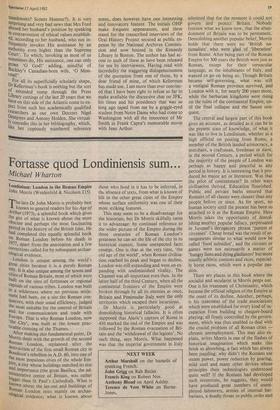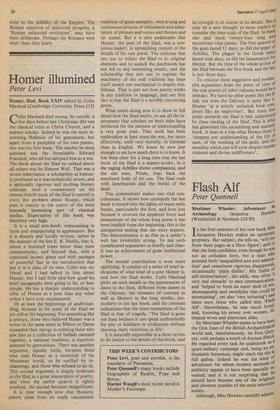Fortasse quod Londiniensis sum...
Michael Wharton
The late Dr John Morris is probably best known to general readers for his Age of Arthur (1973), a splendid book which gives the gist of what is known about the most obscure and perhaps the most fascinating Period in the history of the British Isles. He had completed this equally splendid book on Roman London before his death in 1977, apart from the annotation and a few corrections called for by subsequent archae- ological evidence.
London is unique among the world's great cities because it is a purely Roman City. It is also unique among the towns and cities of Roman Britain, most of which were built on the sites of fortresses or regional capitals of various tribes. London was built in a wilderness where no previous settle- Ment had been, on a site the Roman con- querors, with their usual efficiency, judged the most suitable for the control of Britain and for communication and trade with Europe. That is why Roman London, now the City', was built at the lowest prac- ticable crossing of the Thames.
After making this fundamental point, Dr Morris deals with the growth of the second Roman London, replanned after the destruction of the first small Roman city in Boudicca's rebellion in A.D. 60, into one of the most populous cities of the whole Em- Dire,a city whose buildings matched its size arl.d. importance (the great Basilica, the ad- ministrative centre of Britain, was rather bigger than St Paul's Cathedral). What is known about the lay-out and buildings of `",°111an London rests mainly on archae- °Logical evidence; what is known about
those who lived in it has to be inferred, in thL absence of texts, from what is known of life in the other great cities of the Empire whose surface uniformity was one of their most striking features.
This may seem to be a disadvantage for the historian; but Dr Morris skilfully turns it to advantage: by continual reference to the wider picture of the Empire during the three centuries of Roman London's greatness he can set the life of the city in its historical context. Some unexpected facts emorge. One is that at the very time, 'the old age of the world', when Roman civilisa- tion reached its peak and began to decline, London was still expanding and went on ex- panding with undiminished vitality. The Channel was all-important even then. In the latter half of the third Century, when all the continental frontiers of the Empire were broken through by all its enemies at once, Britain and Peninsular Italy were the only territories which escaped their incursions.
Dr Morris is particularly good at demolishing historical fallacies. It is often supposed that Alaric's capture of Rome in 410 marked the end of the Empire and was followed by the Roman evacuation of Bri- tain and the 'withdrawal of the legions'. No such thing, says Morris. What happened was that the imperial government in Italy admitted that for the moment it could not govern and protect Britain. Nobody foresaw what we know now, that the aban- donment of Britain was to be permanent. Demolishing another popular belief, Morris holds that there were no 'British na- tionalists' who were glad of 'liberation' from Rome. After being part of the Roman Empire for 300 years the British were just as Roman, except for their vernacular language, as the inhabitants of Italy, and wanted to go on being so. Though Britain became self-governing, what was still a vestigial Roman province survived, and London with it, for nearly 200 years more, while the barbarian kingdoms were rising on the ruins of the continental Empire, un- til the final collapse and the Saxon con- quest.
The central and largest part of this book gives an account, as detailed as it can be in the present state of knowledge, of what it was like to live in Londinium, whether as a high official on posting from Rome, a member of the British landed aristocracy, a merchant, a craftsman, freedman or slave, in the second Century, a period which for the majority of the people of London was perhaps as happy and peaceful as any period in history. It is interesting that it pro- duced no major art or literature. Was that the price of contentment? In other ways civilisation thrived. Education flourished. Public and private baths ensured that Romans of all classes were cleaner than any people before or since. As for sport, no human society until the present has been so attached to it as the Roman Empire. Here Morris takes the opportunity of demol- ishing another popular fallacy, perpetuated in Juvenal's derogatory phrase 'panem et circenses'. Cheap bread was the result of ar- rangements similar to what would now be called ' food subsidies°, and the circuses or games were not necessarily a matter of `hungry lions and dying gladiators' but more usually athletic contests and races, especial- ly horse races, which were a popular pas- sion.
There are places in this book where the socialist and secularist in Morris peeps out. One is his treatment of Christianity, which became the official religion of the Empire at the onset of its decline. Another, perhaps, is his treatment of the trade associations which were established for every kind of oc- cupation from building to chequer-board playing; all firmly controlled by the govern- ment, which was thus enabled to deal with the crucial problem of all Roman cities chronic unemployment. This may also ex- plain, writes Morris in one of the flashes of historical imagination which make this book so absorbing, a fact which has always been puzzling: why didn't the Romans use steam power, power reduction by gearing, mild steel and many other devices whose principles their technologists understood quite well? If the Romans had developed such inventions, he suggests, they would have produced great numbers of unem- ployed labourers, armies of internal bar- barians, a deadly threat to public order and even to the stability of the Empire. The Roman rejection of industrial progress, a 'Roman industrial revolution', may have been deliberate. Perhaps the Romans were wiser than they knew.



































 Previous page
Previous page